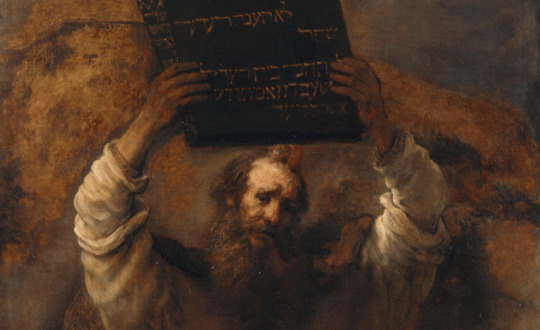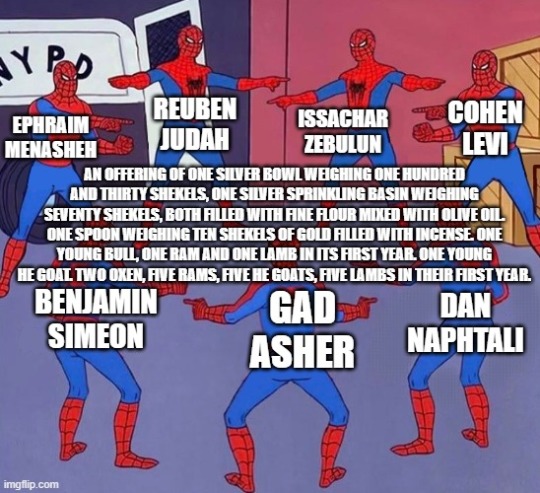#parsha
Note
jewish culture is knowing that u can actually give really good dvars about parshiyot in vayikra because there’s deeper meanings and trends to unpack and not massive amounts of plot to distract you from the real message
.
21 notes
·
View notes
Text
fuck zodiac signs what was your bar/bat/b'nai mitzah torah portion (parsha)???
#mine was lech-lecha#jumblr#judaism#bar mitzvah#bat mitzvah#torah#torah portion#parsha#jewish#zodiac#signs#zodiac signs
222 notes
·
View notes
Text
In this weeks parsha, Yaakov makes a pact with Lavan to not cross into each other's land for harm.
It's a ceasefire. The first one in recorded Jewish history. And it's in THIS week's parsha.
25 notes
·
View notes
Text
i noticed that transwomen were not marked as unkosher, so i will be claiming my free kosher certification tatoo to be place on my right buttcheek so all the other girlies know it’s okay to go in
7 notes
·
View notes
Text

SILENT TESTIMONY
This week’s parsha, Tetzaveh, is the only one in the Torah after the birth of Moses that does not mention his name. The Baal HaTurim attributes this to Moses’ plea to God on behalf of the Jewish people after the sin of the golden calf: “Now, if You will forgive their sin [well and good]; But if not, erase me now from Your book, which You have written.” The words of a tzaddik (saintly and wise individual) have power, and when Moses told God to erase him from the Torah, God did so by erasing Moses from Parsha Tetzaveh.
This seems like a punishment, which is odd because when Moses made that plea to God, it was coming from a place of great humility. Moses was willing to sacrifice himself to bring God’s mercy upon the Jewish people. In fact, his tactic worked and the people were saved. So why is Moses being punished?
Rabbi Yissocher Frand explains that the omission of Moses' name from Parsha Tetzaveh is not a punishment but rather a tribute to the most humble man who ever lived. Since every other parsha contains Moses’ name, the absence of it in Tetzaveh is felt. Rabbi Frand characterizes it as a “silent testimony” to Moses. But why is Tetzaveh the parsha where Moses’ name is absent? Rabbi Frand again invokes Moses’ humility. The parsha is about the Kohen Gadol (High Priest) and his clothing. Moses’ brother Aaron was the Kohen Gadol, and Moshe didn’t want to steal the limelight from his older brother.
Image: “Moses with the Ten Commandments” by Rembrandt, 1659 (detail)
8 notes
·
View notes
Text
in this past week's parsha of Bamidbar, when the parsha introduces Moshe and Aharon counting the Leviim, there are a series of dots over Aharon's name.
these dots are uncommon, but not unheard of, in the Torah.
in Bereishit, when Yaakov and Eisav reunite and kiss, there are a series of dots over the word stating that they kissed. Rashi explains there that the dots are to indicate that actually, Eisav tried to bite Yaakov.
So I (at my lovely girlfriend's instigation) like to imagine that the same is true in Bamidbar: Aharon was counting his fellow Leviim by gently biting every single one.
22 notes
·
View notes
Text
israelites while hashem is telling moshe how to conduct a census
youtube
22 notes
·
View notes
Text

"You shall not have pity: life for life, eye for eye, tooth for tooth, hand for hand, foot for foot." - Parshat Shoftim
Jewish Press Cartoons- Asher Schwartz
8 notes
·
View notes
Text
I never thought I'd read Torah from a fascist perspective before. However, last week's parsha (portion of reading) contains the ordering of deliberate, supposedly divinely ordained genocide. It genuinely reminds me fascism, whether it be nationalistic historical revisionism or what was actually carried out. I'm not too aware of the historical context, but it's an uncomfortable one and I want to learn more about how it fits in others' Torahs. I'm particularly interested in the opinions of biblical absolutists who believe that the Torah as presented is fully the word of God, and therefore cannot accept an answer based on historical context or revisionism.
6 notes
·
View notes
Text

So I did a thing! I made a deck of art cards out of my parsha painting series. It has 54 parsha cards and 12 occasion/ holiday cards. I am waiting for a set to be mailed to me so that I can check them and make sure they look ok, but I should have them available soon!
7 notes
·
View notes
Text
Thoughts after writing up this week’s dvar Torah:
- Iyov says, “The good we receive from G-d, and we should not also be ready to accept evil from him?” (2:6) This is the ultimate answer to the ppl who are like, “well, if you’re supposed to have a benevolent god, then why does he do bad things?” 🙄 Why do YOU think you deserve all good things? You’re basically saying that the entity that has the power to bestow good on the entire world should be tied to your understanding of good and bad? You’re getting good stuff from Hashem- be prepared for the “bad” stuff that comes along with it. You don’t get to pick and choose on a whim!
- Along the same lines: with the פרה אדומה, you have to become impure to make someone else pure. There’s no magic potion that fixes everything- you have to work for it and make tough choices. Everything that’s good in life, even mitzvos - pure, holy things - comes along with a side of hardship, of pain and impurity. It wouldn’t BE good without the bad- there would be no contrast, no context to put it in.
- We do have absolute truths. We have חוקים in the Torah so we can practice saying, “I don’t know why, but G-d said it so it must be the truth.” Then, when we come to events in life that are hard and painful and we can’t begin to comprehend why we have to go through them, we can fall back on that knowledge that G-d made it happen, so there must be a plan somewhere. He’s just not showing it to us right now.
- On another note, how cool is it that our royal family isn’t the pure-blooded stereotype that most other cultures have? Dovid HaMelech comes from a incestous relationship that spawned a nation that became an enemy to the Jews. We’re told of all of their mistakes and bad choices, and it doesn’t make them any less great or holy. You don’t get קדושה without טומאה, and we’re not bad because of the bad things we do.
2 notes
·
View notes
Photo

They weren’t paired up like this, I just can’t make five more Spider-Men.
I mean, I COULD but I’m too lazy
#My Post#Non-fandom#Parsha#Torah Meme#Jumblr#Naso#Torah#Spider-Man#Silly#Meme#Bamidbar#Cartoons#Korban#The Twelve Tribes#My Meme Post#Funny#My Torah Post#Edit#By Zarina A113#I think I'm so gosh darn hilarious#MINE
7 notes
·
View notes
Text
2 notes
·
View notes
Text
Vayishlach - 09.12.2022
Bs"D
Yaakov's Anxiety
"Yaakov was greatly frightened; in his anxiety, he divided the people with him, and the flocks and herds and camels, into two camps" (Bereshis 32:8).
Why would one of the forefathers of Klal Yisroel show anxiety? The biblical forefathers are supposed to be beacons of emuna and bitachon. Chizkuni answers our question, referencing Midrash (Chizkuni on Bereshis 32:8:1)
"...you may well ask that after Yaakov had been met by angels, as we read at the end of the last portion, and these angels were clearly meant to protect him, what did he have to worry about? This obvious question is answered by our sages by explaining that one of these angels was Michael, Yaakov’s protective angel, whereas the second one was Samael, Esau’s angel. Knowing this, Yaakov had no way of knowing which of these two angels was more powerful. This is why he became very fearful." The source of the names of the angels appears to be Bereshis Rabba 78.
Who are Michael and Samael? Michael, Yaakov's angel, is the personification of Chesed. He is named for the first time in Sefer Daniel. Samael, Eisav's angel, is mentioned frequently in Midrash and kabbalistic texts, known for a multitude of reasons - all negative. Samael is known as the Yetzer HaRa, the prosecuting angel for Yaakov and all Israel. In fact, in Sefer HaBahir (Chp. 200) it is revealed that Samael came down in the form of the serpent in order to trick Adam HaRishon. The punishment for this action was to become the guardian of Eisav, an evil man.
Yaakov's fear was not of Eisav himself, but of his guardian, Samael - who was also Yaakov's accuser. Sefer HaChinuch 3:2 references that Samael's intention was to wipe out Yaakov - him, and his descendants - but due to Yaakov's great righteousness, he could not. Instead, Yaakov is injured in the hip - the 'Gid HaNashe'
To note - we do not pronounce the name of Samael, instead calling it "Samech Mem", a custom recorded by R' Chaim Vital and the AriZal's Taamei Hamitzvot (end of Parshat Vayechi)
To read more about this, see the link below:
The Sole Negative Commandment in the Parsha
When Yaakov fights the Malach, he is injured - the 'gid hanashe' is damaged. This translates to the sciatic nerve, hence the halachic prohibition on consuming the sciatic nerve itself (Bereshis 32:33). In Ashkenazi communities today even the rear of the animal is not eaten, as we do not have a mesorah on the removal of the nerve itself. This is codified into halacha in Sefer HaChinuch 3:1;
"Not to eat the sciatic nerve: [Parshat] Vayishlach has one negative commandment, and it is the prohibition of [eating] the sciatic nerve; as it is stated (Genesis 32:33), "Therefore the Children of Israel shall not eat the sciatic nerve." And this [phrase] "they shall not eat" is not to be taken as part of the story, to mean that because this event occurred to [our] forefather, [we, his] descendants refrain from eating that nerve. Rather, it is a warning (prohibition) of God that they shall not eat it."
Bibliography:
Ephraim Palvanov's amazing blog, MayimAchronim.com
All translations/ texts from Sefaria
Mi Yodeya
#dvar torah#halacha#torah#torah portion#torah study#jewish#judaism#orthodox judaism#midrash#sefaria#parsha
3 notes
·
View notes
Text
this list at the link below from hebrewrootsmom.com lists readings from the Torah (the first five Old Testament books) for each week starting in mid-October and beside each selection are included concurrent New Testament Scriptures about Jesus
#God#Christ#Jesus#Salvation through Christ#Hebrew#Judaism#Torah#Passover#Festival of unleavened bread#Parsha
0 notes
